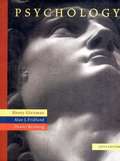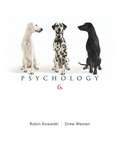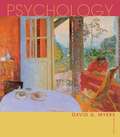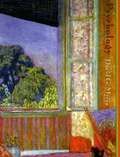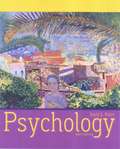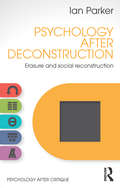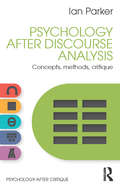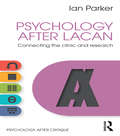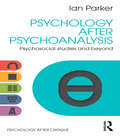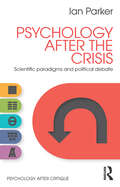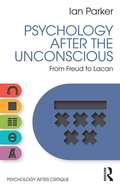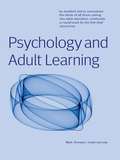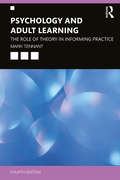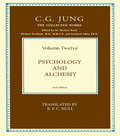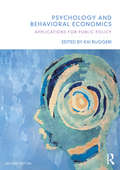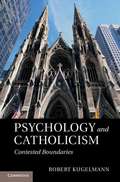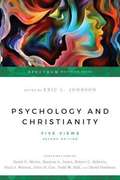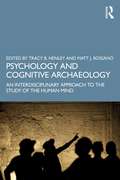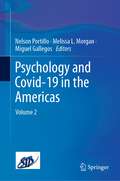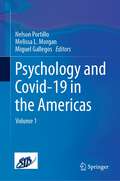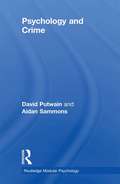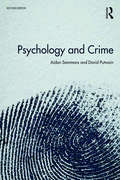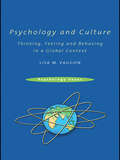- Table View
- List View
Psychology (5th Edition)
by David G. MyersSwitching among several differing perspectives, this introductory textbook describes what scientific research has learned about the biology underlying human behavior and mental processes, changes during the life cycle, states of consciousness, learning and memory, intelligence, emotion, personality, and psychological disorders.
Psychology (6th Edition)
by Robin M. Kowalski Drew WestenPsychologists will discover the inherent drama and indispensable human component of psychology science with this updated text. The Research in Depth feature presents classic case studies along with exercises that help reinforce concepts related to research methodology. New Psychology at Work sections offer information specifically related to I/O or human factors as well as describe the role that psychology plays in various applied settings. Profiles in Positive Psychology also gives psychologists a look at the application of psychology to their daily lives, and exposes them to key topics in positive psychology
Psychology (7th Edition)
by David G. MyersThis new edition continues the story of psychology with added research and enhanced content from the most dynamic areas of the field--cognition, gender and diversity studies, neuroscience and more, while at the same time using the most effective teaching approaches and learning tools.
Psychology (8th edition)
by David G. MyersSwitching among several differing perspectives, this introductory textbook describes what scientific research has learned about the biology underlying human behavior and mental processes, changes during the life cycle, states of consciousness, learning and memory, intelligence, emotion, personality, and psychological disorders. The seventh edition adds a new section on motivation in the workplace, and a psychology timeline inside the hardcover. Annotation ©2004 Book News, Inc., Portland, OR (booknews.com)
Psychology (9th edition)
by David G. MyersSwitching among several differing perspectives, this introductory textbook describes what scientific research has learned about the biology underlying human behavior and mental processes, changes during the life cycle, states of consciousness, learning and memory, intelligence, emotion, personality, and psychological disorders. Annotation ©2004 Book News, Inc., Portland, OR (booknews.com)
Psychology After Deconstruction: Erasure and social reconstruction (Psychology After Critique)
by Ian ParkerIan Parker has been a leading light in the fields of critical and discursive psychology for over 25 years. The Psychology After Critique series brings together for the first time his most important papers. Each volume in the series has been prepared by Ian Parker, and presents a newly written introduction and focused overview of a key topic area. Psychology After Deconstruction is the second volume in the series and addresses three important questions: What is ‘deconstruction’ and how does it apply to psychology? How does deconstruction radicalize social constructionist approaches in psychology? What is the future for radical conceptual and empirical research? The book provides a clear account of deconstruction, and the different varieties of this approach at work inside and outside the discipline of psychology. In the opening chapters Parker describes the challenge to underlying assumptions of ‘neutrality’ or ‘objectivity’ within psychology that deconstruction poses, and its implications for three key concepts: humanism, interpretation and reflexivity. Subsequent chapters introduce several lines of debate, and discuss their relation to mainstream axioms such as ‘psychopathology’, ‘diagnosis’ and ‘psychotherapy’, and alternative approaches like qualitative research, humanistic psychology and discourse analysis. Together, the chapters in this book show how, via a process of ‘erasure’, deconstructive approaches question fundamental assumptions made about language and reality, the self and the social world. By demonstrating the application of deconstruction to different areas of psychology, it also seeks to provide a ‘social reconstruction’ of psychological research. Psychology After Deconstruction is essential reading for students and researchers in psychology, sociology, social anthropology and cultural studies, and for discourse analysts of different traditions. It will also introduce key ideas and debates within deconstruction to undergraduates and postgraduate students across the social sciences.
Psychology After Discourse Analysis: Concepts, methods, critique (Psychology After Critique)
by Ian ParkerIan Parker has been a leading light in the fields of critical and discursive psychology for over 25 years. The Psychology After Critique series brings together for the first time his most important papers. Each volume in the series has been prepared by Ian Parker and presents a newly written introduction and focused overview of a key topic area. Psychology After Discourse Analysis is the third volume in the series and addresses three central questions: How did discourse analysis develop inside psychology? How does discursive psychology address concerns about the traditional ‘laboratory experiment’ paradigm in psychology? What is the future for discourse analysis? The book provides a clear account of the various forms of discourse analysis that have been used within psychology, and provides a review of their significance for a new generation of psychologists. The early chapters present a framework for understanding the origins of these various forms, as well as the differences between them. Emphasizing the gap between discursive psychology and mainstream psychology, Parker then explores relations between discourse analysis, psychoanalysis, social constructionism and the postmodern turn in the social sciences. The final chapters describe the limitations of discourse analysis and explore its flaws as a framework and as a practice, questioning its future within academia and in political and social contexts beyond psychology. Psychology After Discourse Analysis is essential reading for students and researchers in psychology, sociology, social anthropology and cultural studies, and for discourse analysts of different traditions. It will also introduce key ideas and debates within critical psychology to undergraduates and postgraduate students across the social sciences.
Psychology After Lacan: Connecting the clinic and research (Psychology After Critique)
by Ian ParkerIan Parker has been a leading light in the fields of critical and discursive psychology for over 25 years. The Psychology After Critique series brings together for the first time his most important papers. Each volume in the series has been prepared by Ian Parker and presents a newly written introduction and focused overview of a key topic area. Psychology After Lacan is the sixth volume in the series and addresses three central questions: Why is Lacanian psychoanalysis re-emerging in mainstream contemporary psychology? What is original in this account of the human subject? What implications does Lacanian psychoanalysis have for psychology? This book introduces Lacan’s influential ideas about clinical psychoanalysis and contemporary global culture to a new generation of psychologists. The chapters cover a number of key themes including conceptions of the human subject within psychology, the uses of psychoanalysis in qualitative research, different conceptions of ethics within psychology, and the impact of cyberspace on human subjectivity. The book also explores key debates currently occurring in Lacanian psychoanalysis, with discussion of culture, discourse, identification, sexuality and the challenge to mainstream notions of normality and abnormality. Psychology After Lacan is essential reading for students and researchers in psychology, psycho-social studies, sociology, social anthropology and cultural studies, and to psychoanalysts of different traditions engaged in academic research. It will also introduce key ideas and debates within critical psychology to undergraduates and postgraduate students across the social sciences.
Psychology After Psychoanalysis: Psychosocial studies and beyond (Psychology After Critique)
by Ian ParkerIan Parker has been a leading light in the fields of critical and discursive psychology for over 25 years. The Psychology After Critique series brings together for the first time his most important papers. Each volume in the series has been prepared by Ian Parker and presents a newly written introduction and focused overview of a key topic area. Psychology After Psychoanalysis, the fourth volume in the series, is about the impact of psychoanalysis on critical debates in psychology. It addresses three central questions: Why is psychoanalysis re-emerging within psychology? How can psychoanalytic ideas inform psychosocial research? How does psychoanalysis explain the relation between the individual and society? International in scope, the book includes a clear account of psychoanalysis, and the different varieties of the approach that are at work inside and outside the discipline of psychology. It explores the status of psychoanalysis as a series of concepts and as a methodology, and shows how its clinical practice is crucial to the way that it operates now in an academic context. In doing so, the book sheds light on the arguments currently occurring inside psychoanalysis, with discussion of its relation to critical psychology, psychosocial research, the health professions, culture and social theory. Parker shows how psychoanalysis rests on a notion of ‘method’ that is very different from mainstream psychology, and unravels the implications of this difference. Early chapters examine the lines of debate between various psychoanalytical traditions, and show how critical psychology challenges the assumptions about human nature and subjectivity made in conventional psychoanalysis. Later chapters introduce the methodological device of ‘transference’ and explore how psychoanalysis may be utilized as a resource to review key questions of human culture. Psychology After Psychoanalysis is essential reading for students and researchers in psychology, psychosocial studies, sociology, social anthropology and cultural studies, and to psychoanalysts of different traditions engaged in academic research.
Psychology After the Crisis: Scientific paradigms and political debate (Psychology After Critique)
by Ian ParkerIan Parker has been a leading light in the fields of critical and discursive psychology for over 25 years. The Psychology After Critique series brings together for the first time his most important papers. Each volume in the series has been prepared by Ian Parker, features a newly written introduction and presents a focused overview of a key topic area. Psychology After the Crisis is the first volume in the series and addresses three important questions: What was the crisis in psychology and why does it continue now? How did debates regarding the traditional ‘laboratory experiment’ paradigm in psychology set the scene for discourse analysis? Why are these paradigm debates now crucial for understanding contemporary critical psychology? The first two chapters of the book describe the way critical psychology emerged in Britain during the 1970s, and introduce four key theoretical resources: Marxism, Feminism, Post-Structuralism and Psychoanalysis. The chapters which follow consider in depth the critical role of Marxist thinking as an analytic framework within psychology. Subsequent chapters explore the application and limitations of critical psychology for crucial topics such as psychotherapy, counselling and climate change. A final chapter presents an interview which reviews the main strands within critical psychology, and provides an accessible introduction to the series as a whole. Psychology After the Crisis is essential reading for students and researchers in psychology, sociology, social anthropology and cultural studies, and for discourse analysts of different traditions. It will also introduce key ideas and debates in critical psychology for undergraduates and postgraduate students across the social sciences.
Psychology After the Unconscious: From Freud to Lacan (Psychology After Critique)
by Ian ParkerIan Parker has been a leading light in the fields of critical and discursive psychology for over 25 years. The Psychology After Critique series brings together for the first time his most important papers. Each volume in the series has been prepared by Ian Parker and presents a newly written introduction and focused overview of a key topic area. Psychology After the Unconscious is the fifth volume in the series and addresses three central questions: Why is Freud’s concept of the unconscious important today? Does language itself play a role in the creation of the unconscious? How does Lacan radicalize Freud’s notion of the unconscious in relation to cultural research? The book provides a clear explanation of Freudian and Lacanian accounts of the unconscious. It also highlights their role in offering a new way of describing, understanding and working with the human subject in clinical settings and in cultural research. Part One shows how the unconscious is elaborated in Freud’s early case studies in Studies on Hysteria, while Part Two focuses on Lacan’s re-working of the unconscious and its relationship to language and culture in his influential public seminars. The book also provides access to key debates currently occurring in Freudian and Lacanian psychoanalysis, exploring both the clinical dimension and the consequences for psychological and cultural research. Psychology After the Unconscious is essential reading for students and researchers in psychology, psychosocial studies, sociology, social anthropology and cultural studies, and to psychoanalysts of different traditions engaged in academic research. It will also introduce key ideas and debates within critical psychology to undergraduates and postgraduate students across the social sciences.
Psychology and Adult Learning
by Mark TennantThe third edition of this popular book examines the role of psychology in informing adult education practice and has been fully updated to reflect the effect of changes in the structure of society, globalisation, technology and the impact of postmodernism. It explores the traditions of key psychological theories and discusses issues and problems in applying them to an understanding of adult learning and development. It also examines the formation of identities and places increased emphasis on what it means to be a lifelong learner. Dealing with adult learning in a variety of contexts, the topics considered include: humanistic psychology self directed learners psychoanalytic approaches the formation of identities development of intelligence learning styles behaviourism group dynamics and group facilitators critical awareness.
Psychology and Adult Learning: The Role of Theory in Informing Practice
by Mark TennantThe fourth edition of Psychology and Adult Education has been thoroughly updated to encompass shifts in the concerns of adult educators as they respond to changing global social and economic concerns. It examines the role of psychology in informing adult education practice and explores the seminal traditions of key psychological theories as well as discussing issues and problems in applying them to an understanding of adult learning and development. Providing a thoughtful and accessible approach to understanding self and personal change in adult education, and with a new emphasis on diversity, this new edition has been revised and updated in light of the impact of globalising processes, the emphasis on diversity among educators, developments in cognitive neuroscience, the impact of social media, and the theoretical move away from ‘grand theory’. It examines the formation of identities, and places increased emphasis on how a conception of selfhood lies at the heart of teaching adults. Considering adult learning in a variety of contexts, topics covered include: • Humanistic psychology • Selfhood in the adult years • The relevance of neuroscience • Adult intelligence and cognition • Behaviourism • Group learning • Transformative learning Psychology and Adult Learning examines the psychological dimension of adult education work by analysing and critiquing key psychological theories that have informed our understanding. It is essential reading for all those who seek a critical account of how psychology informs contemporary adult education theory and practice.
Psychology and Alchemy: Psychology And Alchemy (Collected Works of C.G. Jung #39)
by C. G. JungAlchemy is central to Jung's hypothesis of the collective unconscious. In this volume he begins with an outline of the process and aims of psychotherapy, and then moves on to work out the analogies between alchemy, Christian dogma and symbolism and his own understanding of the analytic process. Introducing the basic concepts of alchemy, Jung reminds us of the dual nature of alchemy, comprising both the chemical process and a parallel mystical component. He also discusses the seemingly deliberate mystification of the alchemists. Finally, in using the alchemical process as providing insights into individuation, Jung emphasises the importance of alchemy in relating to us the transcendent nature of the psyche.
Psychology and Behavioral Economics: Applications for Public Policy
by Kai RuggeriPsychology and Behavioral Economics offers an expert introduction to how psychology can be applied to a range of public policy areas. It examines the impact of psychological research for public policymaking in economic, financial, and consumer sectors; in education, healthcare, and the workplace; for energy and the environment; and in communications. Your energy bills show you how much you use compared to the average household in your area. Your doctor sends you a text message reminder when your appointment is coming up. Your bank gives you three choices for how much to pay off on your credit card each month. Wherever you look, there has been a rapid increase in the importance we place on understanding real human behaviors in everyday decisions, and these behavioral insights are now regularly used to influence everything from how companies recruit employees through to large-scale public policy and government regulation. But what is the actual evidence behind these tactics, and how did psychology become such a major player in economics? Answering these questions and more, this team of authors, working across both academia and government, present this fully revised and updated reworking of Behavioral Insights for Public Policy. This update covers everything from how policy was historically developed, to major research in human behavior and social psychology, to key moments that brought behavioral sciences to the forefront of public policy. Featuring over 100 empirical examples of how behavioral insights are being used to address some of the most critical challenges faced globally, the book covers key topics such as evidence-based policy, a brief history of behavioral and decision sciences, behavioral economics, and policy evaluation, all illustrated throughout with lively case studies. Including end-of-chapter questions, a glossary, and key concept boxes to aid retention, as well as a new chapter revealing the work of the Canadian government’s behavioral insights unit, this is the perfect textbook for students of psychology, economics, public health, education, and organizational sciences, as well as public policy professionals looking for fresh insight into the underlying theory and practical applications in a range of public policy areas.
Psychology and Catholicism
by Robert KugelmannIn this historical study of psychology and Catholicism, Kugelmann aims to provide clarity in an area filled with emotion and opinion. From the beginnings of modern psychology to the mid-1960s, this complicated relationship between science and religion is methodically investigated. Conflicts such as the boundary of 'person' versus 'soul', contested between psychology and the Church, are debated thoroughly. Kugelmann goes on to examine topics such as the role of the subconscious in explaining spiritualism and miracles; psychoanalysis and the sacrament of confession; myth and symbol in psychology and religious experience; cognition and will in psychology and in religious life; humanistic psychology as a spiritual movement. This fascinating study will be of great interest to scholars and students of both psychology and religious studies but will also appeal to all of those who have an interest in the way modern science and traditional religion coexist in our ever-changing society.
Psychology And Christianity: Five Views (Second Edition) (Christian Association For Psychological Studies Books)
by Eric L. Johnson David G. Myers Stanton L. Jones Robert C. Roberts David A. Powlison P. J. Watson John H. Coe Todd W. HallHow are Christians to understand and undertake the discipline of psychology? This question has been of keen interest (and sometimes concern) to Christians because of the importance we place on a correct understanding of human nature. Psychology can sometimes seem disconnected from, if not antithetical to, Christian perspectives on life. How are we to understand our Christian beliefs about persons in relation to secular psychological beliefs? This revised edition of a widely appreciated text now presents five models for understanding the relationship between psychology and Christianity. All the essays and responses have been reworked and updated with some new contributors including the addition of a new perspective, the transformative view from John Coe and Todd Hall (Biola University).
Psychology and Cognitive Archaeology: An Interdisciplinary Approach to the Study of the Human Mind
by Tracy B. HenleyPsychology and Cognitive Archaeology demonstrates the potential of using cognitive archaeology framing to explore key issues in contemporary psychology and other behavioral sciences. This edited volume features psychologists exploring archaeological data concerning specific themes such as: the use of tools, our child-rearing practices, our expressions of gender and sexuality, our sleep patterns, the nature of warfare, cultural practices, and the origins of religion. Other chapters touch on cognitive archaeological methods, the history of evolutionary approaches in psychology, and relevant philosophical considerations to further illustrate the interdisciplinary potential between archaeology and psychology. As a complementary counterpoint, the book also includes an archaeologist’s perspective on these same topical matters, as well as robust introductory and concluding thoughts by the editors. This book will be an illuminating read for students and scholars of psychology (particularly theoretical, social, cognitive, and evolutionary psychology), as well as philosophy, archaeology, and anthropology.
Psychology and Covid-19 in the Americas: Volume 2
by Nelson Portillo Melissa L. Morgan Miguel GallegosThis book is the second of two volumes that bring together the works presented at the congress "Contributions of Psychology to COVID-19", organized by the Interamerican Society of Psychology in 2020. This was one of the first virtual international meetings on psychology and COVID-19 in the world and brought together researchers and professionals from South, Central and North America in a single online event.The content of both volumes includes many of the first issues addressed by researchers, scholars, and practitioners across the Americas at the start of the pandemic – before vaccines, before knowledge of treatment and impact, before our worlds and daily lives were forever changed. Chapters in the first volume focus on the impacts of the pandemic in mental health, social and family dynamics, educational processes and the work of health professionals. Chapters in the second volume are dedicated to studies addressing the impacts of the pandemic in vulnerable populations; proposals of psychological interventions to deal with the distress caused by COVID-19; strategies of coping, resilience and adaptation; and the development of psychological instruments of measurement and assessments during the pandemic. The content of these two volumes marks a baseline for the collective work initiated by psychologists who came together to answer the call to combat the pandemic across the Americas. In that sense, both volumes are truly a “snapshot in time” that could help us assess in the future how much progress we have made to apply psychology to the pressing demands of our time.
Psychology and Covid-19 in the Americas: Volume 1
by Nelson Portillo Melissa L. Morgan Miguel GallegosThis book is the first of two volumes that bring together the works presented at the congress "Contributions of Psychology to COVID-19", organized by the Interamerican Society of Psychology in 2020. This was one of the first virtual international meetings on psychology and COVID-19 in the world and brought together researchers and professionals from South, Central and North America in a single online event. The content of both volumes includes many of the first issues addressed by researchers, scholars, and practitioners across the Americas at the start of the pandemic – before vaccines, before knowledge of treatment and impact, before our worlds and daily lives were forever changed. Chapters in the first volume focus on the impacts of the pandemic in mental health, social and family dynamics, educational processes and the work of health professionals. Chapters in the second volume are dedicated to studies addressing the impacts of the pandemic in vulnerable populations; proposals of psychological interventions to deal with the distress caused by COVID-19; strategies of coping, resilience and adaptation; and the development of psychological instruments of measurement and assessments during the pandemic. The content of these two volumes marks a baseline for the collective work initiated by psychologists who came together to answer the call to combat the pandemic across the Americas. In that sense, both volumes are truly a “snapshot in time” that could help us assess in the future how much progress we have made to apply psychology to the pressing demands of our time.
Psychology and Crime (Routledge Modular Psychology)
by Aidan SammonsWhat does a Criminological Psychologist do? The popular image is that of a latter-day Sherlock Holmes helping the police to solve crimes and mysteries, but the reality is much more complex. Psychology and Crime is a new introduction to the topic of Criminological Psychology that helps dispel these popular myths by providing a comprehensive overview of the topic of Criminological Psychology.The book includes both classic and contemporary psychological theory and research on a range of criminological issues including the nature, measurement and causes of crime, police work and offender profiling, eye-witness memory, trial procedures, jury decision making and the treatment of crime. Putwain and Sammons have produced an introductory text which covers the material on this topic in the A2 components of the AQA-B, OCR and Edexcel A-Level specifications. Psychology and Crime is also ideal for undergraduate students looking for an introduction to criminological psychology and for students studying psychology and media. It will also be useful for those who work in fields related to criminology such as the police and probation services, social workers and therapists.
Psychology and Crime: 2nd edition (Routledge Modular Psychology Ser.)
by Aidan Sammons David PutwainWhat does a criminological psychologist actually do? Most people picture a modern-day Sherlock Holmes, helping the police to solve crimes, but the reality is far more interesting and complex. Psychology and Crime offers a fascinating introduction to criminological psychology, providing the reader with a comprehensive grounding in everything from cognitive forensics to police interviewing. Concise, informative and accessible, the book explores a range of theories to understand criminal behaviour, from the physiological to the social. It covers a range of contexts within the criminal justice system where psychology offers unique insights, including police investigation, the perspective of witnesses and victims, and courtroom proceedings. Thoroughly updated throughout to reflect developments in the field, and featuring new chapters covering cybercrime, terrorism and insights from neuroscience, this edition also includes a student-friendly ‘Apply your learning’ feature and case studies to bring the research to life. Accessibly written for all levels, and with concise coverage of both classic and contemporary psychological theory, this is the ideal book for anyone studying criminal or forensic psychology.
Psychology and Culture: Thinking, Feeling and Behaving in a Global Context
by Lisa VaughnWith increasing globalization, countries face social, linguistic, religious and other cultural changes that can lead to misunderstandings in a variety of settings. These changes can have broader implications across the world, leading to changing dynamics in identity, gender, relationships, family, and community. This book addresses the subsequent need for a basic understanding of the cultural dimensions of psychology and their application to everyday settings. The book discusses the basis of culture and presents related theories and concepts, including a description of how cognition and behavior are influenced by different sociocultural contexts. The text explores a broad definition of culture and provides practical models to improve intercultural relations, communication, and cultural competency. Each chapter contains an introduction, a concise overview of the topic, a practical application of the topic using current global examples, and a brief summary. This up to date overview of psychology and culture is ideal reading for undergraduate and graduate students and academics interested in culturally related topics and issues.

